Infection with the factor CagA, which is translocated into host cells via the gastric bacterium Helicobacter pylori can cause chronic inflammation and is a major risk factor for gastric adenocarcinoma in humans. While the virulence pathogen’s type 4 secretion system, has been directly...
The International Workshops on Genomic Epidemiology (formerly the Paris Workshops) are held every two years to introduce researchers to the advances that underpin large-scale genomic studies of diseases and other life sciences areas, particularly in the context of on-going research funded by the EU...
We used a hybridization approach to enrich the DNA from 17,367 protein-coding genes in two Neandertal individuals from Spain and Croatia. By analyzing these two exomes together with the genome sequence of a Neandertal from Siberia we show that the genetic diversity of Neandertals was lower than...
Hematopoiesis, where a single hematopoietic stem cell gives rise to the entire blood system, is an important model for differentiation with great medical importance. While the hematopoietic system is perhaps the most characterized model system of cellular commitment and differentiation, we...
Over 30 million Europeans are affected by one of the known 7,000 rare diseases. Symptoms are usually chronic, degenerative and life-threatening; in fact, 30% of patients die before their 5th birthday and there is no effective treatment for the large majority of rare diseases.
Most rare diseases...
Chromatin plays a major regulatory role in development. The current dogma of cellular differentiation presents a model of progressive closing of the regulatory potential of the genome during cellular differentiation.
According to this model, differentiation is a gradual transition from an open...

















